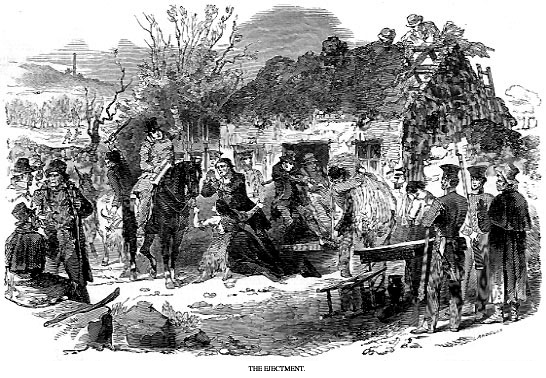
"The Ejectment" from the London Illustrated Times Dec. 16, 1848
Co. Cavan was hard hit by the Great Famine in the mid-nineteenth century. In the fall of 1848, the local landlord in Mountnugent parish evicted 700 people in one day. The famous ballad "By Lough Sheelin Side" is based on this event witnessed by the local Catholic priest.
Evictions and Disease (the Potato Famine)
In the autumn of 1847 the potato crop was a total failure. The government was no longer providing relief so responsibility for feeding the starving masses was left to the limited resources of Irish landowners. Many Cavan County landlords responded to the best of their ability and bankrupted themselves in doing so. Others tried a more pragmatic approach. Landlords were assessed a local poor law tax based on the number of tenants on their property. To relieve themselves of the burden of paying this tax, they payed their tenants to emigrate, or simply evicted them and hoped they would move out of the local area. [further research in estate papers for Hamilton's response to famine, include Poor law report information on Scrabby parish]
The following account of a brutal eviction in the fall of 1848 on an estate in Tonagh, County Cavan was given by a young priest:
In the very First year of our ministry, as a missionary priest in this diocese we were an eye-witness of a cruel and inhuman eviction, which even still makes our heart bleed as often as we allow ourselves to think of it. Seven hundred human beings were driven from their homes in one day and set adrift on the world, to gratify the caprice of one who, before God and man, notably deserved less consideration than the last and least of them. And we remember well that there was not a single shilling of rent due on the estate at the time, except by one man; and the character and acts of that man made it perfectly clear that the agent and himself quite understood each other.
The Crowbar Brigade, employed on the occasion to extinguish the hearths and demolish the homes of honest, industrious men, worked away with a will at their awful calling until evening. At length an incident occurred that varied the monotony of the grim, ghastly ruin which they were spreading all around. They stopped suddenly, and recoiled panic-stricken with terror from two dwellings which they were directed to destroy with the rest. They had just learned that a frightful typhus fever held those houses in its grasp, and had already brought pestilence and death to their inmates. They therefore supplicated the agent to spare these houses a little longer; but the agent was inexorable and insisted that the houses should come down. The ingenuity with which he extricated himself from the difficulties of the situation was characteristic alike of the heartlessness of the man and of the cruel necessities of the work in which he was engaged. He ordered a large winnowing-sheet to be secured over the beds in which the fever victims lay - fortunately they happened to be perfectly delirious at the time - and then directed the houses to be unroofed cautiously and slowly, because, he said, `he very much disliked the bother and discomfort of a coroner's inquest.' I administered the last Sacrament of the Church to four of these fever victims next day; and save the above-mentioned winnowing-sheet, there was not then a roof nearer to me than the canopy of heaven.
The horrid scenes I then witnessed I must remember all my lifelong. The wailing of women - the screams, the terror, the consternation of children - the speechless agony of honest, industrious men - wrung tears of grief from all who saw them. I saw the officers and men of a large policed force, who were obliged to attend on the occasion, cry like children at beholding the cruel sufferings of the very people whom they would be obliged to butcher had they offered the least resistance. The heavy rains that usually attend the autumnal equinoxes descended in cold, copious torrents throughout the night, and at once revealed to those houseless sufferers the awful realities of their condition. I visited them next morning, and rode from place to place administering to them all the comfort and consolation I could. The appearance of men, women, and children, as they emerged from the ruins of their former homes - saturated with rain, blackened and besmeared with soot, shivering in every member from cold and misery - presented positively the most appalling spectacle I have ever looked at.

"The Ejectment" from the London Illustrated Times Dec. 16, 1848